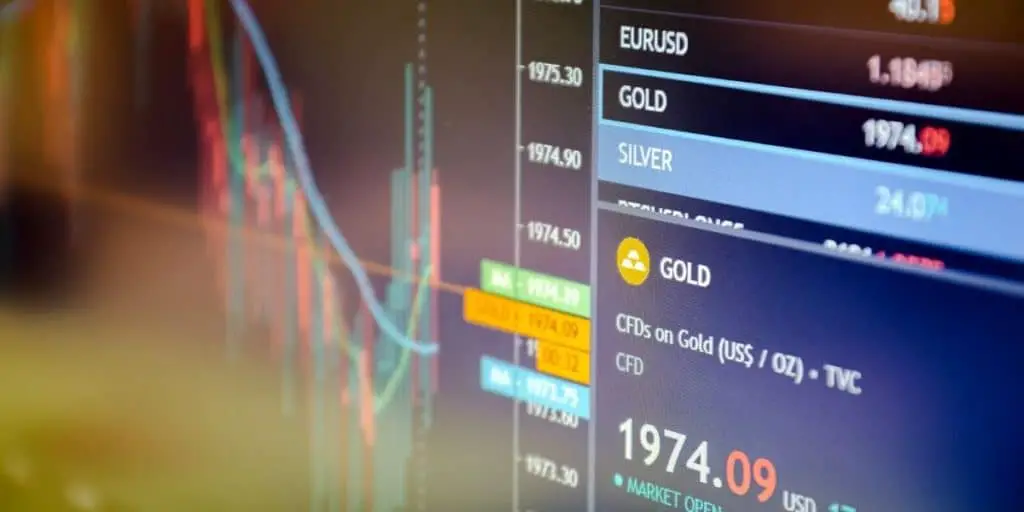Gold has been a valuable asset for thousands of years. Its historical uses include currency, jewelry, decorations, and (more recently) electronics. Due to its high value as both an asset and a metal with so many practical and decorative applications, it’s natural to wonder if trading gold is profitable and if you can get rich doing it.
Gold trading can be profitable, though it requires time, patience, and attention to detail. Many serious investors like to add it to their portfolios to hedge against more volatile assets like Bitcoin and some stocks. Just like Bitcoin, which has a limit, supply and demand impact gold prices.
The following information will help you decide if trading gold is suitable for you or if you just want to have it as part of a diversified investment portfolio.
IMPORTANT SIDENOTE: I surveyed 1500+ traders to understand how social trading impacted their trading outcomes. The results shocked my belief system! Read my latest article: ‘Exploring Social Trading: Community, Profit, and Collaboration’ for my in-depth findings through the data collected from this survey!
Table of Contents
How Is Gold Normally Traded?
Investors typically treat gold like a commodity in which you may not ever actually see your holdings. You just have a certificate saying that you own a certain amount of gold that exists in a safe place.

Only having a piece of paper or digital file can be rather disappointing to people who like the idea of holding their gold in their hands.
Some sellers like APMEX are popular with retail investors because they usually ship their customers actual, physical gold coins or bars in your choice of design and weight, as measured in grams or ounces. The positive aspect of holding your precious metals is that you don’t have to take somebody else’s word for it that the gold exists.
The downsides are that you’ll be the one responsible for securely storing your holdings, and it can be challenging to sell physical gold and silver holdings for their full market value.
The profitability of trading gold can depend on several factors.
Gold Supply and Demand
Many trading strategies depend on the idea that any particular asset will naturally seek its fair market value. This principle makes technical analyses an essential part of most professional traders’ toolkit, even though using technical analysis alone to predict price moves only has a 60% success rate.
In the case of gold, the market value is very dependent on supply and demand.
Active gold mines are constantly increasing the supply of gold, though the exact rate is dependent on the price of gold. As Bitcoin creator Satoshi Nakamoto put it when discussing energy usage for the generation of a store of value, which environmentalists have criticized as wasteful:
“The marginal cost of gold mining tends to stay near the price of gold. Gold mining is a waste, but that waste is far less than the utility of having gold available as a medium of exchange.”
Just as there will only ever be 21 million whole bitcoins, the supply of gold will ultimately remain finite even with mining activities. This limit means the price of gold is a measure of demand more than it is a measure of supply.
Research Before Investing
Warren Buffett said, “Never invest in a business you cannot understand.” The same should hold for any asset you might be considering investing in, including gold.
If you can explain it to a five-year-old, you may be ready to start investing in it. That means doing your research, even if it means watching those cheesy animated explainer videos to start with.
Questions that you should be able to answer include:
- How does the precious metals industry work?
- Who’s buying gold and why?
- Who’s selling gold and why?
- Is it better to hold physical gold or a certificate of ownership of gold in a vault somewhere?
- What are those commercials on TV that offer gold- and silver-backed investment plans trying to sell me? What makes a gold IRA different from other forms of IRA?
- What makes gold similar to other types of assets? What makes it different?
- What does everybody successful in trading precious metals (like gold) have in common?
Once you can answer these questions, you may be ready to continue to the next steps in profitable gold trading.
Form a Solid Investment Strategy
Start by answering the question: “What are my goals for investing in any asset, let alone gold?”
If your goal is to get rich quick, you’ll inevitably lose money due to impatience while trading. Even worse, you may unwittingly become part of an illegal pump-and-dump scheme and, in an extreme case, have to answer some tough questions from the FBI.
While it isn’t always a bad thing to take advantage of an opportunity that suddenly presents itself, Warren Buffet once said of the difference between successful traders and those who went broke, “The most important quality for an investor is temperament, not intellect.”
A trader with the right temperament isn’t overly affected by the emotions that lead to impulsive decisions, like the classic “Fear of Missing Out” and “Fear, Uncertainty, Doubt.” They’ll stick to a strategy that earns them a profit over the long term even when other, less experienced traders are panicking.
The occasional mistake doesn’t make you a bad investor.
Even Warren Buffett lost money on some trades. The thing to keep in mind about gold is that it’s not a “get rich quick” scheme, which means you will need a solid long-term investment strategy to profit from gold.
Be Careful When Watching Price Charts
Successful traders will watch both price charts and news tickers with the latest headlines and will have done their research on the history of an asset or company outside of historical price data before they buy.
Major breaking news can indicate that the price of gold is about to move. Many failed trades occur because the investor became too hyperfocused on price charts and excluded anything else that might affect an asset’s value.
When looking at new investments like gold, consider the following variables:
- Sustainable growth. Is this car company building new factories? Is that social media company losing active members? Is there a future for precious metals like gold other than being pretty metals that tend to hold their value over time?
- Long-term price trends. While long-term investors might sometimes be curious about what caused an asset to move quickly in the short term, they usually won’t sweat it much if the investment is a solidly performing one otherwise. They like to look at an asset’s performance over the past few years, as well as track down any available news to avoid another Enron, to see if they should simply “buy the dip,” wait on that one, or sell their holdings.
- “Explain Like I’m Five.” Warren Buffett will usually avoid industries that he doesn’t understand, even if they’re growth industries. If you don’t understand something, see if you can find an expert outside of those who profit from selling assets like gold who can answer your questions in simple terms and without using buzzwords.
Most of all, make sure you have as complete a picture as possible before investing in an asset like gold. Gold can move independently of other investments like stocks and bonds and has grown in value even when the stock market tanked.

It has a utility that stocks simply don’t have because some industries, like jewelry and electronics, actually use it to manufacture their products. It helps to avoid treating it like a stock and be especially careful when watching those charts.
Author’s Recommendations: Top Trading and Investment Resources To Consider
Before concluding this article, I wanted to share few trading and investment resources that I have vetted, with the help of 50+ consistently profitable traders, for you. I am confident that you will greatly benefit in your trading journey by considering one or more of these resources.
- Roadmap to Becoming a Consistently Profitable Trader: I surveyed 5000+ traders (and interviewed 50+ profitable traders) to create the best possible step by step trading guide for you. Read my article: ‘7 Proven Steps To Profitable Trading’ to learn about my findings from surveying 5000+ traders, and to learn how these learnings can be leveraged to your advantage.
- Best Broker For Trading Success: I reviewed 15+ brokers and discussed my findings with 50+ consistently profitable traders. Post all that assessment, the best all round broker that our collective minds picked was M1 Finance. If you are looking to open a brokerage account, choose M1 Finance. You just cannot go wrong with it! Click Here To Sign Up for M1 Finance Today!
- Best Trading Courses You Can Take For Free (or at extremely low cost): I reviewed 30+ trading courses to recommend you the best resource, and found Trading Strategies in Emerging Markets Specialization on Coursera to beat every other course on the market. Plus, if you complete this course within 7 days, it will cost you nothing and will be absolutely free! Click Here To Sign Up Today! (If you don’t find this course valuable, you can cancel anytime within the 7 days trial period and pay nothing.)
- Best Passive Investment Platform For Exponential (Potentially) Returns: By enabling passive investments into a Bitcoin ETF, Acorns gives you the best opportunity to make exponential returns on your passive investments. Plus, Acorns is currently offering a $15 bonus for simply singing up to their platform – so that is one opportunity you don’t want to miss! (assuming you are interested in this platform). Click Here To Get $15 Bonus By Signing Up For Acorns Today! (It will take you less than 5 mins to sign up, and it is totally worth it.)
Conclusion
Gold simply isn’t a “get rich quick” scheme and can work best as one slice of your investment portfolio’s pie chart alongside stocks, bonds, and even cryptocurrency and crypto-based tokens if you’re feeling adventurous.
It can be profitable, but you can also lose your shirt if you fail to follow the tips and tricks of top investors like Warren Buffet. It helps to keep emotions and impulsiveness out of the equation when making an investment decision like adding gold to your portfolio.
BEFORE YOU GO: Don’t forget to check out my latest article – ‘Exploring Social Trading: Community, Profit, and Collaboration’. I surveyed 1500+ traders to identify the impact social trading can have on your trading performance, and shared all my findings in this article. No matter where you are in your trading journey today, I am confident that you will find this article helpful!
Affiliate Disclosure: We participate in several affiliate programs and may be compensated if you make a purchase using our referral link, at no additional cost to you. You can, however, trust the integrity of our recommendation. Affiliate programs exist even for products that we are not recommending. We only choose to recommend you the products that we actually believe in.
Recent Posts
Exploring Social Trading: Community, Profit, and Collaboration
Have you ever wondered about the potential of social trading? Well, that curiosity led me on a fascinating journey of surveying over 1500 traders. The aim? To understand if being part of a trading...
Ah, wine investment! A tantalizing topic that piques the curiosity of many. A complex, yet alluring world where passions and profits intertwine. But, is it a good idea? In this article, we'll uncork...
